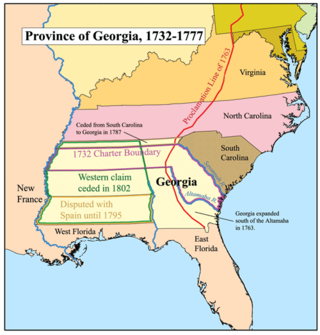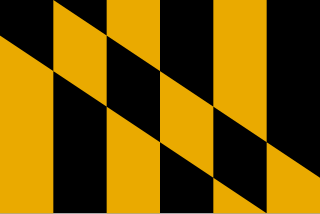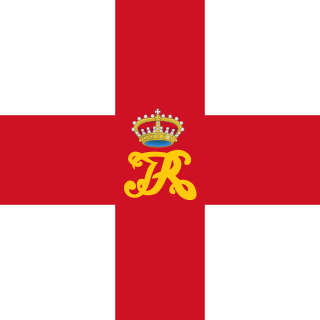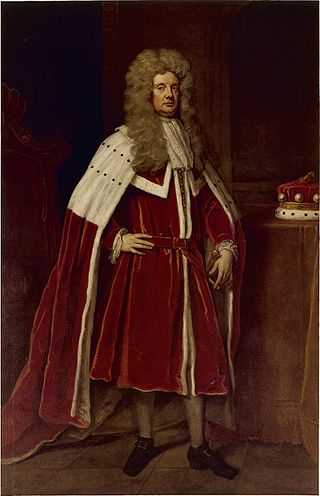
The Thirteen Colonies refers to the group of British colonies on the Atlantic coast of North America which broke away from the British Crown in the American Revolutionary War (1775–1783),and joined to form the United States of America.

The Maryland Toleration Act,also known as the Act Concerning Religion,was the first law in North America requiring religious tolerance for Christians. It was passed on April 21,1649,by the assembly of the Maryland colony,in St. Mary's City in St. Mary's County,Maryland. It created one of the pioneer statutes passed by the legislative body of an organized colonial government to guarantee any degree of religious liberty. Specifically,the bill,now usually referred to as the Toleration Act,granted freedom of conscience to all Christians. Historians argue that it helped inspire later legal protections for freedom of religion in the United States. The Calvert family,who founded Maryland partly as a refuge for English Catholics,sought enactment of the law to protect Catholic settlers and those of other religions that did not conform to the dominant Anglicanism of Britain and her colonies.

Cecil Calvert,2nd Baron Baltimore was an English politician and lawyer who was the first proprietor of Maryland. Born in Kent,England in 1605,he inherited the proprietorship of overseas colonies in Avalon (Newfoundland),along with Maryland after the 1632 death of his father,George Calvert,1st Baron Baltimore (1580–1632),for whom it had been originally intended in a vast land grant from King Charles I. Young Calvert proceeded to establish and manage the Province of Maryland as a proprietary colony for English Catholics from his English country house of Kiplin Hall in North Yorkshire.

The Southern Colonies within British America consisted of the Province of Maryland,the Colony of Virginia,the Province of Carolina,and the Province of Georgia. In 1763,the newly created colonies of East Florida and West Florida would be added to the Southern Colonies by Great Britain until the Spanish Empire took back Florida. These colonies were the historical core of what would become the Southern United States,or "Dixie". They were located south of the Middle Colonies,albeit Virginia and Maryland were also called the Chesapeake Colonies.

The Province of Maryland was an English and later British colony in North America from 1634 until 1776,when the province was one of the Thirteen Colonies that joined in supporting the American Revolution against Great Britain. In 1781,Maryland was the 13th signatory to the Articles of Confederation. The province's first settlement and capital was in St. Mary's City,located at the southern end of St. Mary's County,a peninsula in the Chesapeake Bay bordered by four tidal rivers.

The Dominion of New England in America (1686–1689) was a short-lived administrative union of English colonies covering all of New England and the Mid-Atlantic Colonies,with the exception of the Delaware Colony and the Province of Pennsylvania. The region's political structure was one of centralized control similar to the model used by the Spanish monarchy under the Viceroyalty of New Spain. The dominion was unacceptable to most colonists because they deeply resented being stripped of their rights and having their colonial charters revoked. Governor Edmund Andros tried to make legal and structural changes,but most of these were undone and the Dominion was overthrown as soon as word was received that King James II had vacated the throne in England. One notable change was the forced introduction of the Church of England into Massachusetts,whose Puritan leaders had previously refused to allow it any foothold.

Charles Calvert,3rd Baron Baltimore was an English colonial administrator. He inherited the province of Maryland in 1675 upon the death of his father,Cecil Calvert,2nd Baron Baltimore. He had been his father's Deputy Governor since 1661 when he arrived in the colony at the age of 24. However,Charles left Maryland for England in 1684 and would never return. The events following the Glorious Revolution in England in 1688 would cost Calvert his title to Maryland;in 1689 the royal charter to the colony was withdrawn,leading to direct rule by the British Crown. Calvert's political problems were largely caused by his Roman Catholic faith which was at odds with the established Church of England.

Benedict Leonard Calvert,4th Baron Baltimore was an English colonial administrator and politician who represented Harwich in the House of Commons of Great Britain from 1714 to 1715. He was the second son of Charles Calvert,3rd Baron Baltimore and Jane Lowe,and became his father's heir upon the death of his elder brother Cecil in 1681.
Richard Ingle was an English sea captain,tobacco trader,and privateer in colonial Maryland. Along with William Claiborne,Ingle revolted against Maryland Catholic leaders in the name of English Parliament and Puritans in a period known as the Plundering Time. Ingle and his men attacked ships and captured the colonial capital of the proprietary government in St. Mary's City.
John Coode is best known for leading a rebellion that overthrew Maryland's colonial government in 1689. He participated in four separate uprisings and briefly served as Maryland's governor (1689–1691) as the 1st Leader of the Protestant Associators.
Josias Fendall(c. 1628 –c. 1687) was an English colonial administrator who served as the Proprietary Governor of Maryland. He was born in England,and came to the Province of Maryland. He was the progenitor of the Fendall family in America.

Colonel Thomas Brooke Jr. of Brookefield was President of the Council in Maryland and acting 13th Proprietary Governor of the Province of Maryland. He was the son of Major Thomas Brooke Sr. and Esquire and his second wife Eleanor Hatton who later remarried Col. Henry Darnall. He was grandson of the Reverend Robert Brooke Sr.,who had similarly held the office briefly during the Cromwellian period in 1652.

Darnall's Chance,also known as Buck House,Buck-Wardrop House,or James Wardrop House,is a historic home located at 14800 Governor Oden Bowie Drive,in Upper Marlboro,Prince George's County,Maryland,United States.
Sir Lionel Copley was the 1st Royal Governor of Maryland from 1692 through his death in 1693. He was the first official royal governor appointed by the British crown after the colony was removed from the proprietary control of the Calvert family during the Glorious Revolution. Copley engaged in a series of political struggles with the colonial assembly and the colonial secretary,Thomas Lawrence,in the year between his arrival and his death the next year.

Charles Carroll,sometimes called Charles Carroll the Settler to differentiate him from his son and grandson,was an Irish-born planter and lawyer who spent most of his life in the English Province of Maryland. Carroll,a Catholic,is best known for his efforts to hold office in the Protestant-dominated colony which eventually resulted in the disfranchisement of Maryland's Catholics. The second son of Irish Catholic parents,Carroll was educated in France as a lawyer before returning to England,where he pursued the first steps in a legal career. Before that career developed,he secured a position as Attorney General of the young colony of Maryland. Its founder George Calvert,1st Baron Baltimore and his descendants intended it as a refuge for persecuted Catholics.

The situation of the Catholic Church in the Thirteen Colonies was characterized by an extensive religious persecution originating from Protestant sects,which would barely allow religious toleration to Catholics living on American territory. Nonetheless,Catholics were a part of colonial history from the beginning,especially in Maryland,a colony founded by Catholics,and Rhode Island,a colony founded explicitly for religious toleration. The situation was complicated greatly by the evolving role of the English Crown,which acted as both Supreme Governor of the Church of England and the Head of State of the thirteen colonial governments in almost all periods of colonial rule.

Colonel Henry Darnall was an Irish-born planter,militia officer and politician who served as the chancellor of Maryland from 1683 to 1689. He was also appointed as the proprietary agent for Charles Calvert,3rd Baron Baltimore and also briefly served as deputy governor of Maryland. During the 1689 Protestant Revolution,his proprietarial army was defeated by Protestant rebels led by John Coode,and Darnall was stripped of his numerous colonial offices as a result. He died in 1711,leaving the bulk of his substantial estates to his son,Henry Darnall II.
Colonel William Digges was a prominent planter,soldier and politician in the Colony of Virginia and Province of Maryland. The eldest son of Edward Digges (1620-1674/5),who sat on the Virginia Governor's Council for two decades but died shortly before Bacon's Rebellion,Digges fled to Maryland where he married Lord Calvert's stepdaughter and served on the Maryland Proprietary Council until losing his office in 1689 during the Protestant Revolution,when a Puritan revolt upset the Calvert Proprietorship. His eldest son Edward sold his primary Virginia plantation to his uncle Dudley Digges. It is now within Naval Station Yorktown. His former Maryland estate,Warburton Manor,is now within Fort Washington Park. Two additional related men with the same name served in the Virginia General Assembly,both descended from this man's uncle and his grandson Cole Digges (burgess):William Digges (burgess) and his nephew and son-in-law William Digges Jr. both represented now-defunct Warwick County,Virginia.

The Protestant Revolution,also known Coode's Rebellion after one of its leaders,John Coode,took place in the summer of 1689 in the English Province of Maryland when Protestants,by then a substantial majority in the colony,revolted against the proprietary government led by the Catholic Charles Calvert,3rd Baron Baltimore.
Henry Darnall II (1682-1759) was a wealthy Roman Catholic planter in Colonial Maryland. He was the son of the politician and planter Henry Darnall,who was the Proprietary Agent of Charles Calvert,3rd Baron Baltimore,and served for a time as Deputy Governor of the Province. During the Protestant Revolution of 1689,Henry Darnall I's proprietarial army was defeated by the Puritan army of Colonel John Coode,and he was stripped of his numerous colonial offices. After his father's death,Henry Darnall II did not enjoy political power in Maryland,but he remained wealthy thanks to his family's extensive estates. He married twice,fathering many children. His eldest son Henry Darnall III (c1702-c1783) inherited the bulk of what remained of his estates,and one of his grandchildren,Daniel Carroll,would become one of the Founding Fathers of the United States. A small portion of Darnall's former property,now called Darnall's Chance,can still be visited today.
















